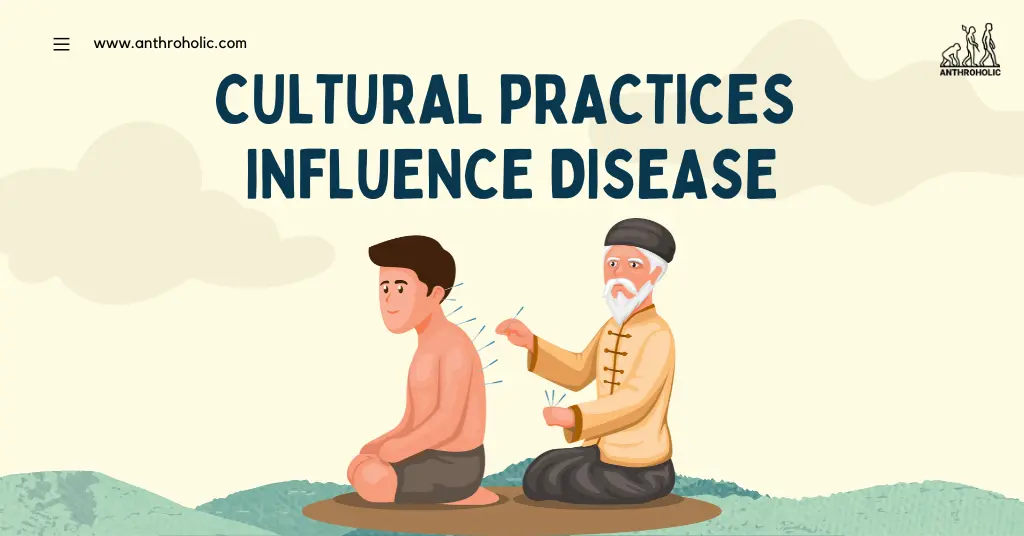AI Answer Evaluation Platform Live Now. Try Free Answer Evaluation Now
Cultural Practices Influence Disease
Cultural practices across the globe have an undeniable impact on disease patterns. Through various customs, beliefs, and rituals, communities create an environment that may either foster or hinder disease. The anthropologists’ explore the nexus between cultural practices and disease, encompassing aspects such as diet, hygiene, social structure, traditional medicine, and more. The analysis aims to shed light on how cultural nuances contribute to the prevalence or control of specific illnesses, with a focus on diverse geographical locations.

Dietary Practices
Influence on Non-communicable Diseases
- High-Fat Diets: In certain Western cultures, diets rich in saturated fats contribute to high incidences of heart disease.
- Lack of Fruit and Vegetables: In some societies, the lack of fresh produce leads to deficiencies and related health problems.
Table 1: Dietary Influence on Disease
| Culture | Dietary Habits | Common Diseases |
|---|---|---|
| Western | High-fat, processed foods | Heart disease |
| Asian | Low-fat, seafood | Lower obesity rates |
| African | Grain-based, low meat | Nutritional deficiencies |
Traditional Food Processing and Preservation
- Fermentation: Beneficial in many Asian cultures in promoting gut health.
- Sun-Drying: May lead to contamination and disease if not performed correctly.
Hygiene Practices
Ritual Cleansing
- Some cultures incorporate washing as part of religious practice, affecting general hygiene levels positively.
- In contrast, some practices involve the use of unclean water, leading to waterborne diseases.
Tattooing and Scarification
- In specific tribes, traditional methods can spread diseases like Hepatitis if tools are not properly sterilized.
Social Structure and Gender Roles
Women’s Health
- Female Genital Mutilation (FGM): Practiced in certain African cultures, FGM can lead to severe health issues and infections.
- Childbearing Age: Cultural norms may influence the age of childbirth, impacting maternal and child health.
Social Support Systems
- Family and community support in some cultures plays a significant role in mental health and wellbeing.
Traditional Medicine and Belief Systems
Use of Herbal Medicine
- Often, traditional remedies are effective, though some may cause harm if improperly used.
- Lack of regulation can lead to unstandardized treatments and unexpected side effects.
Spiritual and Ritual Healing
- In some cultures, diseases are considered spiritual in origin, and thus spiritual healing practices are prevalent.
- Such practices may divert from scientifically-proven treatments, causing delays in proper care.
Health Education and Communication
Impact of Cultural Norms on Health Education
- Language and Symbolism: Misunderstandings can occur when health messages are not culturally sensitive or appropriately translated.
- Stigma and Taboos: In some cultures, diseases (e.g., HIV/AIDS) are stigmatized, making communication and prevention more difficult.
Strategies for Effective Communication
- Cultural Sensitivity Training: For healthcare providers, to ensure understanding and empathy towards cultural practices.
- Community Engagement: Involving community leaders and local influencers in healthcare promotion can build trust and facilitate effective communication.
Medical Practices and Healthcare Systems
Cultural Attitudes towards Medical Practices
- Preference for Traditional over Modern Medicine: In some cultures, there’s a reluctance to embrace modern medical practices, impacting disease prevention and treatment.
- Access to Healthcare: Cultural attitudes towards gender, age, and social status may impact access to healthcare, influencing disease patterns.
Integrating Traditional and Modern Healthcare
- Cooperative Models: Integrating traditional healers into the modern healthcare system has shown success in some African and Asian contexts.
- Regulatory Measures: Governments and healthcare authorities can ensure that traditional practices meet safety and efficacy standards.
Table 2: Integrative Approaches to Healthcare in Different Cultures
| Culture | Traditional Practices | Integration with Modern Healthcare |
|---|---|---|
| Chinese | Acupuncture, Herbalism | Incorporated in many hospitals |
| African | Herbal Medicine | Collaboration with traditional healers |
| Native American | Spiritual Healing | Community-centered healthcare models |
Conclusion
Cultural practices are inextricably linked with disease, influencing the way diseases are understood, treated, and prevented. Public health initiatives must recognize and navigate these complex relationships. By fostering dialogue, respecting cultural norms, and integrating beneficial traditional practices, a more holistic and effective approach to health and disease management can be achieved.




